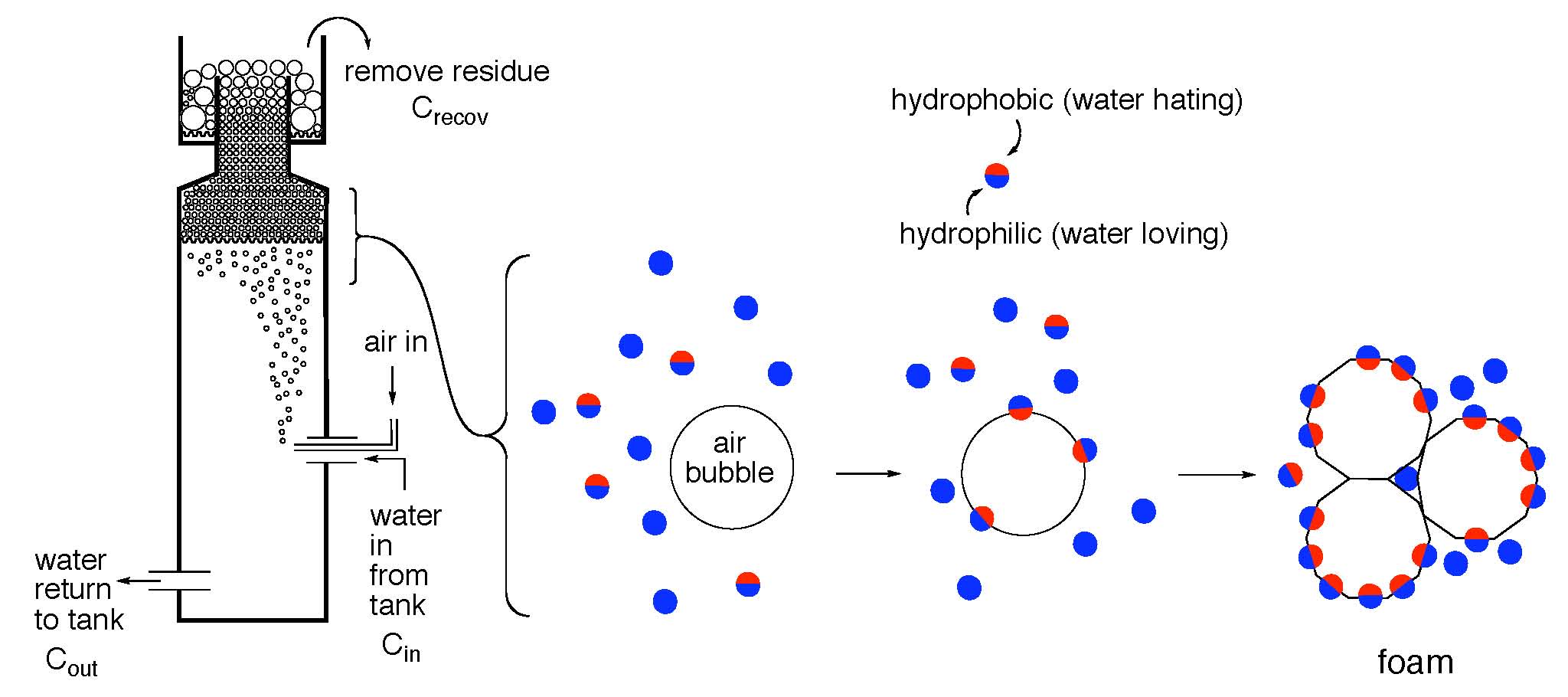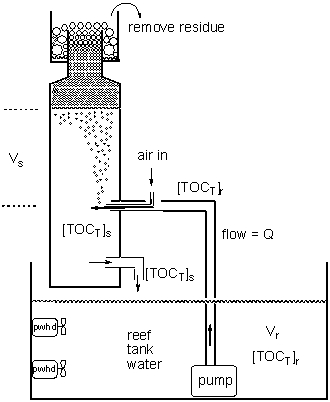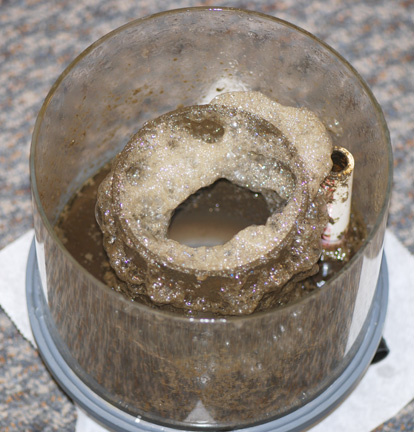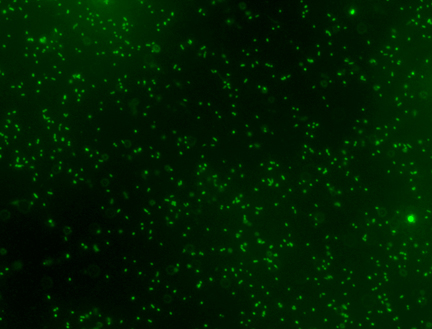so.. basically, Carbon feeds bacteria. Bacteria comes in all size and shapes - some are good, some are bad. when you dose carbon you basically are increasing DOC in the water. DOC doesn't differentiate if it feeds the good vs the bad bacteria.
there's actual new research that looked into algae growth that seem to show that its not "excess nutrient" that causes algae, but rather this cycle of algae ->releasing DOC/sugars via photosynthesys ->bad bacteria on coral surface eat the DOC -> localized O2 level drop due to bacteria ->coral suffocate and die - >local rotting coral flesh fuel more bacteria.
maybe i'm butchering the explanation but @Timfish is the first one that showed this to me with his links to direct research source. I have since stopped dosing carbon. I dose amino instead.
Kinda, yeah ;D but it is an incredibly complex subject. I'd add some forms of DOC promote autotrophic microbial processes beneficial to corals and some forms promote heterotrophic microbial processes that can be detrimental to corals.
I think you may have butchered itbut I’m sure I would have also.
when you say you’re not dosing carbon, Aren’t amino acid a carbon source?!
Amino acids are organic nitrogen.
The problem I see with carbon dosing is no one can deterimine whether the microbial processes being promoted are benefiting nuisance algae or corals. Another unkown variable is many sponges and especially the cryptic species ubiquitous in reef systems are processing DOC 1000X faster than bacterioplankton. These sponges are differetnially prcessing DOC depending on the source and may benefit corals or may be part of feedback loops that promote nuisance algae. AquaBiomics tests might be of help but other wise there's no way to determine short term or long term what's happening. Here's a bunch of links. First is Rohwer's "Coral Reefs in the Microbial Seas" While he doesn't touch on sponges his book and video are an excellent introduction to the subject. Then are some videos by scientists researching corals sponges and reef ecosystems most I think will find infromative. hen there's a whole slew of links to papers (some need to be purchased to read but the abstracts will still convey important info for those not inclined to by them). And I think it's important to point out research done at University of Texas in Austin has shown significant differences in immune system resilliancy at the genotype level, so the innate resistance of a clone line is also a factor in these equations.
"Coral Reefs in the Microbial Seas" This video compliments Rohwer's book of the same title (Paper back is ~$20, Kindle is ~$10), both deal with the conflicting roles of the different types of DOC in reef ecosystems. While there is overlap bewteen his book and the video both have information not covered by the other and together give a broader view of the complex relationships found in reef ecosystems
Changing Seas - Mysterious Microbes
Nitrogen cycling in hte coral holobiont
BActeria and Sponges
Maintenance of Coral Reef Health (refferences at the end)
DOC can be roughly seperated into three catagories, Labile, Semirefractory and Refractory. Most of the following papaers are looking mainly at Labile DOC. This will raise the hackles on some reefers but keep in mind Labile DOC and Carbon Dosing are pretty much synonamous. Jasper deGeoij's work shows cryptic sponges remove labile DOC about a thousand times faster than bacterioplankton. Included are links to some of the research showing what cryptic sponges are doing as well. Also, researchers seem to use DOM (Dissolved Organic Matter) and DOC (Dissolved Organic Carbon) interchangebly although for purists there may be important distinctions.
Indirect effects of algae on coral: algae‐mediated, microbe‐induced coral mortality
Error - Cookies Turned Off
Influence of coral and algal exudates on microbially mediated reef metabolism.
Coral DOC improves oxygen (autotrophy), algae DOC reduces oxygen (heterotrophy).
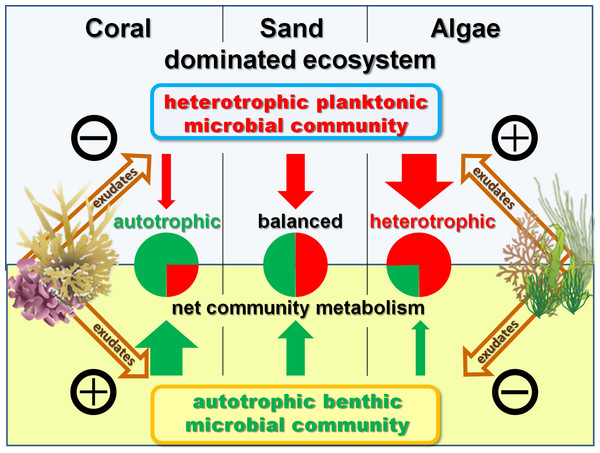
Influence of coral and algal exudates on microbially mediated reef metabolism
Benthic primary producers in tropical reef ecosystems can alter biogeochemical cycling and microbial processes in the surrounding seawater. In order to quantify these influences, we measured rates of photosynthesis, respiration, and dissolved organic carbon (DOC) exudate release by the dominant...
Role of elevated organic carbon levels and microbial activity in coral mortality
Effects of Coral Reef Benthic Primary Producers on Dissolved Organic Carbon and Microbial Activity
Algae releases significantly more DOC into the water than coral.
Effects of Coral Reef Benthic Primary Producers on Dissolved Organic Carbon and Microbial Activity
Benthic primary producers in marine ecosystems may significantly alter biogeochemical cycling and microbial processes in their surrounding environment. To examine these interactions, we studied dissolved organic matter release by dominant benthic taxa and subsequent microbial remineralization in...
Pathologies and mortality rates caused by organic carbon and nutrient stressors in three Caribbean coral species.
Starch and sugars (doc) caused coral death but not high nitrates, phosphates or ammonium.
Visualization of oxygen distribution patterns caused by coral and algae
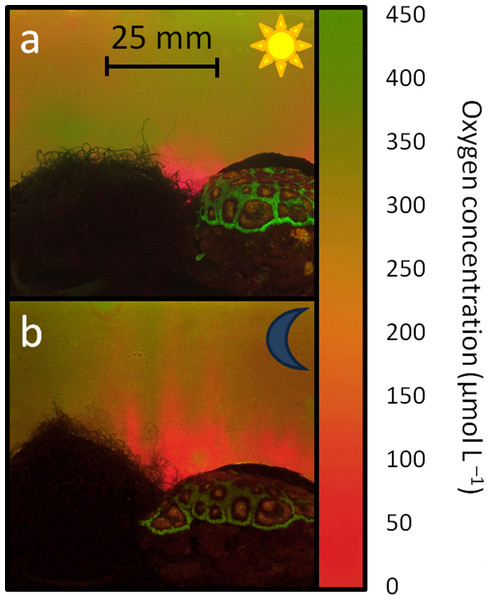
Visualization of oxygen distribution patterns caused by coral and algae
Planar optodes were used to visualize oxygen distribution patterns associated with a coral reef associated green algae (Chaetomorpha sp.) and a hermatypic coral (Favia sp.) separately, as standalone organisms, and placed in close proximity mimicking coral-algal interactions. Oxygen patterns were...
Biological oxygen demand optode analysis of coral reef-associated microbial communities exposed to algal exudates
Exposure to exudates derived from turf algae stimulated higher oxygen drawdown by the coral-associated bacteria.

Biological oxygen demand optode analysis of coral reef-associated microbial communities exposed to algal exudates
Algae-derived dissolved organic matter has been hypothesized to induce mortality of reef building corals. One proposed killing mechanism is a zone of hypoxia created by rapidly growing microbes. To investigate this hypothesis, biological oxygen demand ...
Microbial ecology: Algae feed a shift on coral reefs
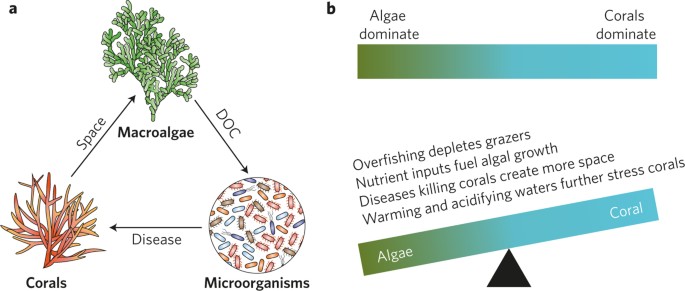
Microbial ecology: Algae feed a shift on coral reefs - Nature Microbiology
Human pressures on coral reefs are giving macroalgae a competitive advantage over reef-building corals. These algae support larger, and potentially pathogenic, microbial populations that are metabolically primed for less-efficient, yet faster, carbohydrate remineralization, perpetuating a...
Coral and macroalgal exudates vary in neutral sugar composition and differentially enrich reef bacterioplankton lineages.

Coral and macroalgal exudates vary in neutral sugar composition and differentially enrich reef bacterioplankton lineages - PubMed
Increasing algal cover on tropical reefs worldwide may be maintained through feedbacks whereby algae outcompete coral by altering microbial activity. We hypothesized that algae and coral release compositionally distinct exudates that differentially alter bacterioplankton growth and community...
Sugar enrichment provides evidence for a role of nitrogen fixation in coral bleaching
Error - Cookies Turned Off
Elevated ammonium delays the impairment of the coral-dinoflagellate symbiosis during labile carbon pollution
(here's an argument for maintaining heavy fish loads if you're carbon dosing)
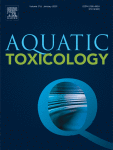
Elevated ammonium delays the impairment of the coral-dinoflagellate symbiosis during labile carbon pollution
Labile dissolved organic carbon (DOC) is a major pollutant in coastal marine environments affected by anthropogenic impacts, and may significantly con…
Excess labile carbon promotes the expression of virulence factors in coral reef bacterioplankton
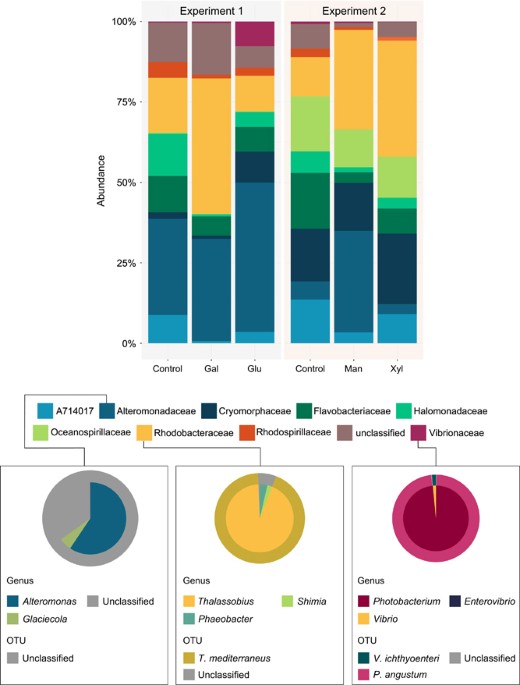
Excess labile carbon promotes the expression of virulence factors in coral reef bacterioplankton - The ISME Journal
Coastal pollution and algal cover are increasing on many coral reefs, resulting in higher dissolved organic carbon (DOC) concentrations. High DOC concentrations strongly affect microbial activity in reef waters and select for copiotrophic, often potentially virulent microbial populations. High...
Unseen players shape benthic competition on coral reefs.

Unseen players shape benthic competition on coral reefs - PubMed
Recent work has shown that hydrophilic and hydrophobic organic matter (OM) from algae disrupts the function of the coral holobiont and promotes the invasion of opportunistic pathogens, leading to coral morbidity and mortality. Here we refer to these dynamics as the (3)DAM [dissolved organic...
Allelochemicals Produced by Brown Macroalgae of the Lobophora Genus Are Active against Coral Larvae and Associated Bacteria, Supporting Pathogenic Shifts to Vibrio Dominance.

Allelochemicals Produced by Brown Macroalgae of the Lobophora Genus Are Active against Coral Larvae and Associated Bacteria, Supporting Pathogenic Shifts to Vibrio Dominance - PubMed
Diverse microbial communities associate with coral tissues and mucus, providing important protective and nutritional services, but once disturbed, the microbial equilibrium may shift from a beneficial state to one that is detrimental or pathogenic. Macroalgae (e.g., seaweeds) can physically and...
Macroalgae decrease growth and alter microbial community structure of the reef-building coral, Porites astreoides.

Macroalgae decrease growth and alter microbial community structure of the reef-building coral, Porites astreoides - PubMed
With the continued and unprecedented decline of coral reefs worldwide, evaluating the factors that contribute to coral demise is of critical importance. As coral cover declines, macroalgae are becoming more common on tropical reefs. Interactions between these macroalgae and corals may alter the...
Macroalgal extracts induce bacterial assemblage shifts and sublethal tissue stress in Caribbean corals.

Macroalgal extracts induce bacterial assemblage shifts and sublethal tissue stress in Caribbean corals - PubMed
Benthic macroalgae can be abundant on present-day coral reefs, especially where rates of herbivory are low and/or dissolved nutrients are high. This study investigated the impact of macroalgal extracts on both coral-associated bacterial assemblages and sublethal stress response of corals. Crude...
Biophysical and physiological processes causing oxygen loss from coral reefs.
Global microbialization of coral reefs
DDAM Proven
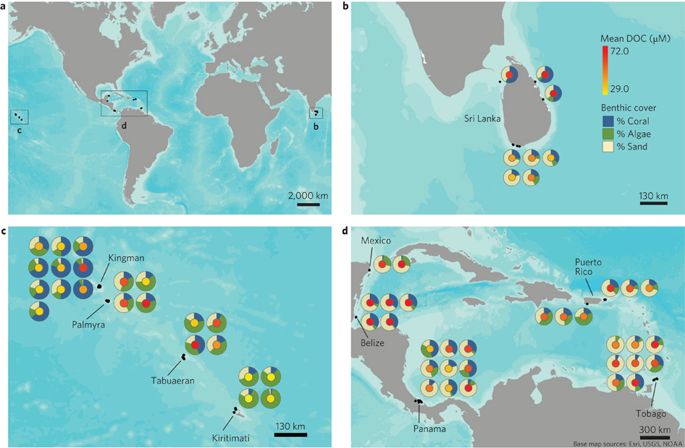
Global microbialization of coral reefs - Nature Microbiology
Analysis of 60 sites in three ocean basins suggests that overgrowth of fleshy algae on coral reefs supports higher microbial abundances dominated by copiotrophic, potentially pathogenic bacteria via the provision of dissolved inorganic carbon.
Coral Reef Microorganisms in a Changing Climate, Fig 3

Coral Reef Microorganisms in a Changing Climate
Coral reefs are one of the most diverse and productive ecosystems on the planet, yet they have suffered tremendous losses due to anthropogenic disturbances and are predicted to be one of the most adversely affected habitats under future climate change ...
Ecosystem Microbiology of Coral Reefs: Linking Genomic, Metabolomic, and Biogeochemical Dynamics from Animal Symbioses to Reefscape Processes
Because sponges are essential players in the carbon, nitrogen and phosphorus cycle(s) on reefs here's some links to research done with them.
Element cycling on tropical coral reefs.
This is Jasper de Geoij's ground breaking research on reef sponges. (The introduction is in Dutch but the content is in English.)
Sponge symbionts and the marine P cycle
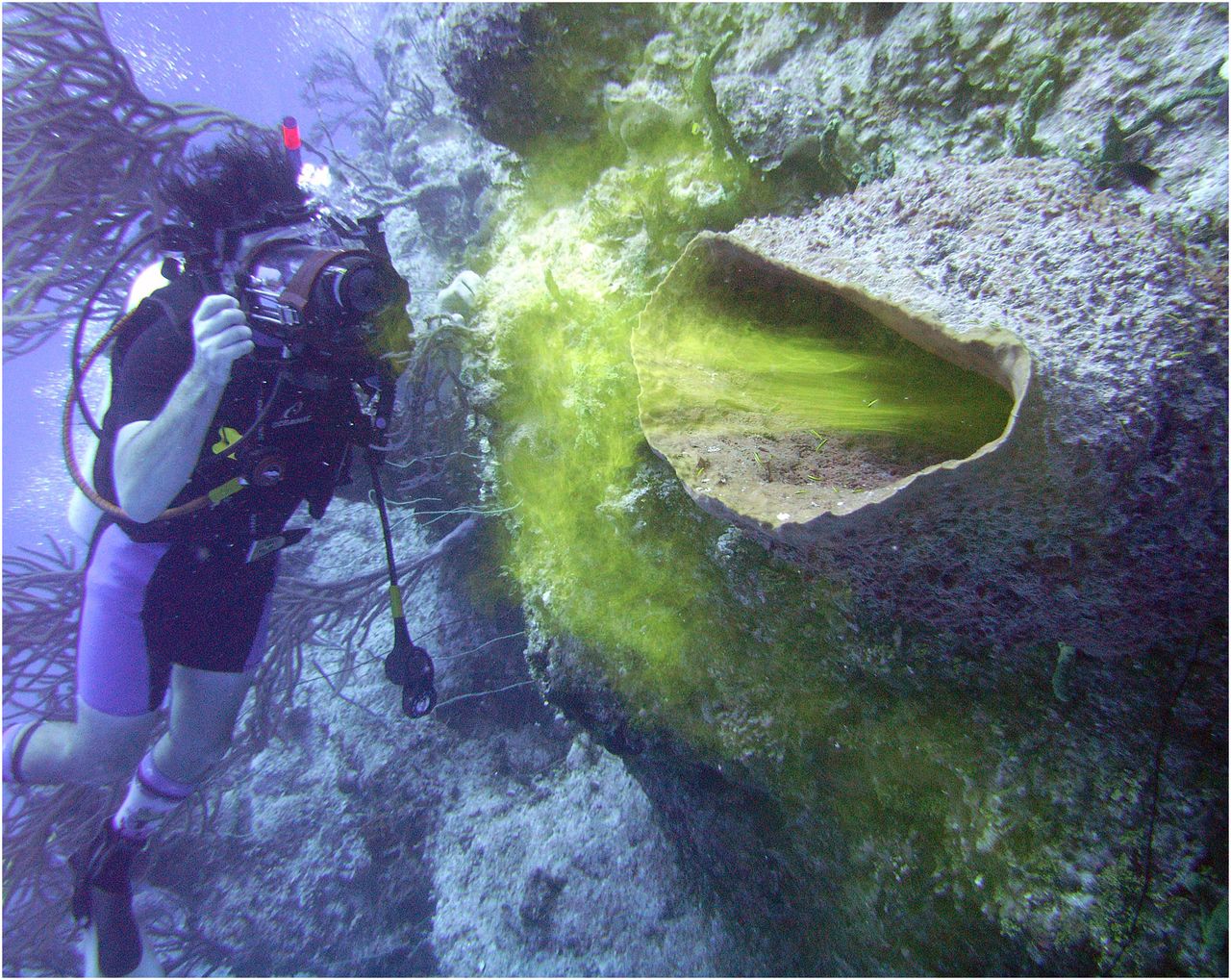
Sponge symbionts and the marine P cycle
Marine sponges are ubiquitous colonizers of shallow, clear-water environments in the oceans (1, 2). Sponges have emerged as significant mediators of biogeochemical fluxes in coastal zones by virtue of respiring organic matter and facilitating both the consumption and release of nutrients (3, 4)...
Phosphorus sequestration in the form of polyphosphate by microbial symbionts in marine sponges
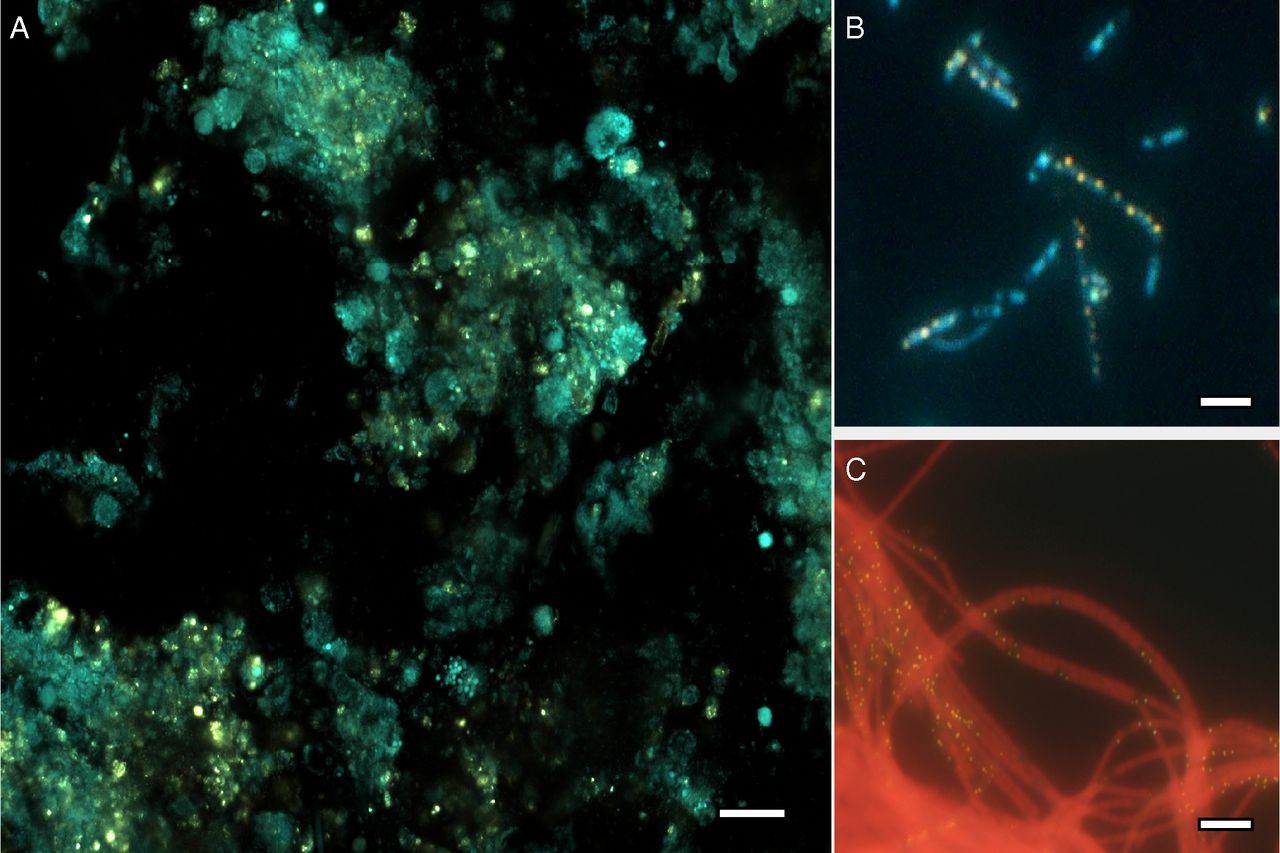
Phosphorus sequestration in the form of polyphosphate by microbial symbionts in marine sponges
Coral reefs are highly productive ecosystems that raise a conundrum called “Darwin’s paradox”: How can high production flourish in low-nutrient conditions? We show here that in three abundant Caribbean sponges, the granules that have been commonly observed in sponge tissue for decades are...
Differential recycling of coral and algal dissolved organic matter via the sponge loop.
Sponges treat DOC from algae differently than DOC from corals
Error - Cookies Turned Off
Surviving in a Marine Desert The Sponge Loop Retains Resources Within Coral Reefs
Dissolved organic carbon and nitrogen are quickly processed by sponges and released back into the reef food web in hours as carbon and nitrogen rich detritus.
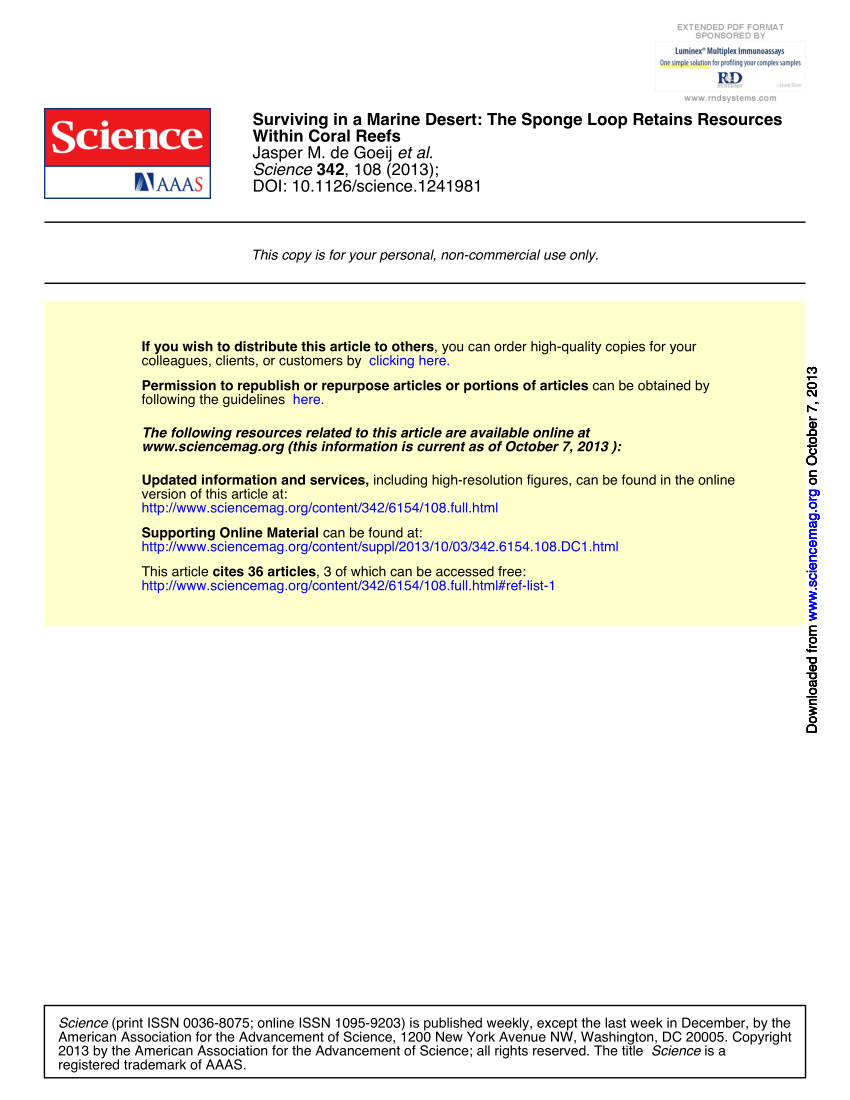
(PDF) 2013 deGoeij Science Sponge loop
PDF | On Jun 23, 2015, Jasper M de Goeij and others published 2013 deGoeij Science Sponge loop | Find, read and cite all the research you need on ResearchGate
Natural Diet of Coral-Excavating Sponges Consists Mainly of Dissolved Organic Carbon (DOC)

Natural Diet of Coral-Excavating Sponges Consists Mainly of Dissolved Organic Carbon (DOC)
Coral-excavating sponges are the most important bioeroders on Caribbean reefs and increase in abundance throughout the region. This increase is commonly attributed to a concomitant increase in food availability due to eutrophication and pollution. We ...
The Role of Marine Sponges in Carbon and Nitrogen Cycles of COral Reefs and Nearshore Environments.
The role of marine sponges in carbon and nitrogen cycles of coral reef and nearshore environments - ProQuest
Explore millions of resources from scholarly journals, books, newspapers, videos and more, on the ProQuest Platform.
And since we're discussing favorable and not so favorable bacteria here's a paper looking at how different corals and polyps are influencing the bacteria in the water column.
Aura-biomes are present in the water layer above coral reef benthic macro-organisms

Aura-biomes are present in the water layer above coral reef benthic macro-organisms - PubMed
As coral reef habitats decline worldwide, some reefs are transitioning from coral- to algal-dominated benthos with the exact cause for this shift remaining elusive. Increases in the abundance of microbes in the water column has been correlated with an increase in coral disease and reduction in...
And here's some stuff on phosphorus and nitrogen:
Ammonium Uptake by Symbiotic and Aposymbiotic Reef Corals
Ammonium Uptake by Symbiotic and Aposymbiotic Reef Corals: Ingenta Connect
Amino acids a source of nitrogen for corals
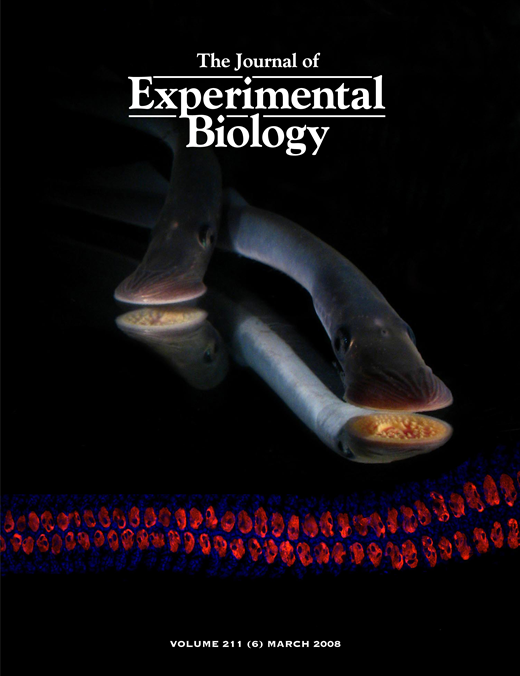
Uptake of dissolved free amino acids by the scleractinian coral Stylophora pistillata
SUMMARY. This study was designed to assess the importance of dissolved free amino acids (DFAA) as a nitrogen source for the scleractinian coral Stylophora pistillata. For this purpose, experiments were performed using 15N-enriched DFAAs, and %15N enrichment was measured both in animal tissue and...
Urea a source of nitrogen for corals
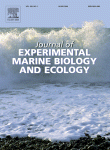
Urea uptake by the scleractinian coral Stylophora pistillata
Urea can be one of the major sources of nitrogen for phytoplankton, but little is known about its importance for corals. Experiments were therefore de…
Diazotrpophs a source of nitrogen for corals

Diazotrophs: a non-negligible source of nitrogen for the tropical coral Stylophora pistillata - PubMed
Corals are mixotrophs: they are able to fix inorganic carbon through the activity of their symbiotic dinoflagellates and to gain nitrogen from predation on plankton and uptake of dissolved organic and inorganic nutrients. They also live in close association with diverse diazotrophic communities...
Context Dependant Effects of Nutrient Loading on the Coral-Algal Mutualism

Context-dependent effects of nutrient loading on the coral-algal mutualism | Request PDF
Request PDF | Context-dependent effects of nutrient loading on the coral-algal mutualism | Human-mediated increases in nutrient availability alter patterns of primary production, impact species diversity, and threaten ecosystem function.... | Find, read and cite all the research you need on...
An experimental mesocosm for long-term studies of reef corals | Journal of the Marine Biological Association of the United Kingdom | Cambridge Core
An experimental mesocosm for long-term studies of reef corals - Volume 92 Issue 4
Phosphate Deficiency:
Nutrient enrichment can increase the susceptibility of reef corals to bleaching:
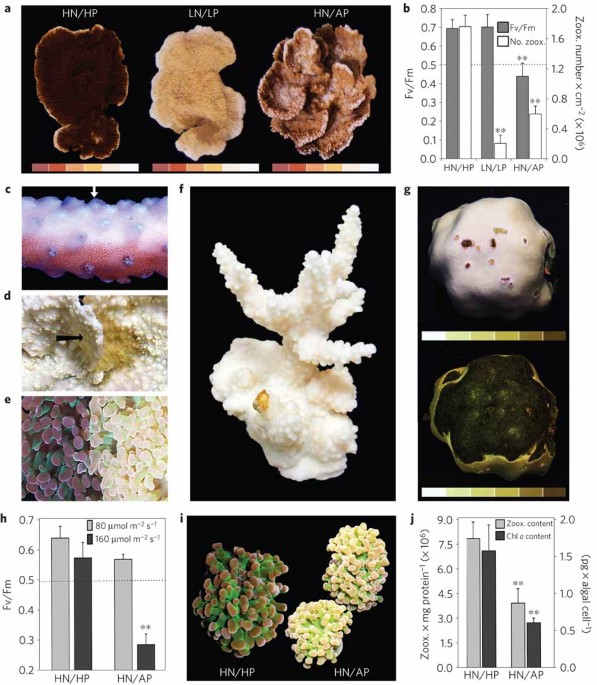
Nutrient enrichment can increase the susceptibility of reef corals to bleaching - Nature Climate Change
Increased dissolved inorganic nitrogen (DIN) concentrations in sea water have been linked to a reduction of the temperature threshold at which corals bleach, however, the mechanism underlying this change is not known. This phenomenon is now explained in terms of increased phosphatase activities...
Ultrastructural Biomarkers in Symbiotic Algae Reflect the Availability of Dissolved Inorganic Nutrients and Particulate Food to the Reef Coral Holobiont:

Ultrastructural Biomarkers in Symbiotic Algae Reflect the Availability of Dissolved Inorganic Nutrients and Particulate Food to the Reef Coral Holobiont
Reef building corals associated with symbiotic algae (zooxanthellae) can access environmental nutrients from different sources, most significantly via the uptake of dissolved inorganic nutrients by the algal symbiont and heterotrophic feeding of the coral host. Climate change is expected to...
Phosphate deficiency promotes coral bleaching and is reflected by the ultrastructure of symbiotic dinoflagellates
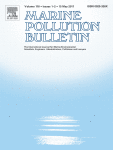
Phosphate deficiency promotes coral bleaching and is reflected by the ultrastructure of symbiotic dinoflagellates
Enrichment of reef environments with dissolved inorganic nutrients is considered a major threat to the survival of corals living in symbiosis with din…
Effects of phosphate on growth and skeletal density in the scleractinian coral Acropora muricata: A controlled experimental approach (increasing phosphate increases growth)
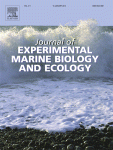
Effects of phosphate on growth and skeletal density in the scleractinian coral Acropora muricata: A controlled experimental approach
Phosphate contamination can negatively affect corals, modifying growth rates, skeletal density, reproduction, mortality, and zooxanthellae. We determi…
High phosphate uptake requirements of the scleractinian coral Stylophora pistillata
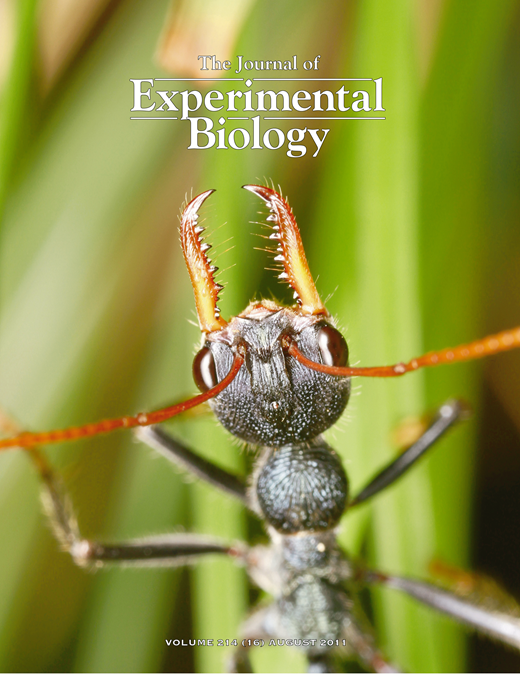
High phosphate uptake requirements of the scleractinian coral Stylophora pistillata
SUMMARYSeveral untested aspects of the regulation of inorganic nutrient uptake were examined using nutrient depletion experiments with the symbiotic coral Stylophora pistillata. The total inhibition of phosphate uptake in artificial seawater lacking sodium indicates the involvement of a...
Phosphorus metabolism of reef organisms with algal symbionts
2657円まるいち 博多辛子明太子(無着色) 「博多の華」 (ギフト用) 180g Z6572海産物イクラ,タラコ,魚卵 Qoo10] 「博 まるいち 博多辛子明太子(無着色) | therichross.com
2657円まるいち 博多辛子明太子(無着色) 「博多の華」 (ギフト用) 180g Z6572海産物イクラ,タラコ,魚卵 Qoo10] 「博 まるいち 博多辛子明太子(無着色) | therichross.com
therichross.com





